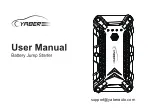
Radiolink Electronic Ltd
60
4.3.13
FLAP-TRIM (see GLID 3.3.4)
4.3.14 CONDITION
Channel 3's function is selectable in the ARBK-FUNC item. (Throttle
stick, switches, or knobs) By choosing except STK, channel 3's
function may be separated from Butterfly’s function, so channel 3 can
be used for other functions.
Adjustability:
• Channel 3's fu
nction:
STK: THROTTLE STICK
Sw-A to H: SWITCH A to H
Vr-A to Vr-E: KNOB A to E
Part. 5 HELICOPTER MODEL FUNCTIONS
Please note that nearly all of the BASIC menu functions are the same for airplane (ACRO setup), sailplane
(GLID setups), and helicopter (HELI) setups. The features that are identical refer back to the ACRO chapter.
5.1 BASIC SETTING WITH HELICOPTER
This guideline is intended to help you set up a basic (H-1) heli, to get acquainted with the radio, to give you
a jump start on using your new radio, and to give you some ideas and direction on how to do even more with
this powerful system than you may have already considered.
Briefly, the typical helicopter's controls are as follows:
• Aileron: Changes cyclic lateral (roll). Roll the helic
opter. Tilt the swash plate to the left or right CH1.
• Elevator: Changes cyclic pitch. Change the helicopter’s angle of attack (nose up or nose down). Tilt the
entire Swash plate fore and aft. CH2.
• Rudder: Change the angle of the tail rotor and yaw the
helicopter left or right. CH4.
• Collective Pitch: Adjusts main rotor collective [angle of the paddles], changing the main blades’ pitch.
Increased collective pitch (with throttle) causes the helicopter to rise. Moves in conjunction with throttle on the
THROTTLE STICK. CH6.
• Throttle: Open/close carburetor. Move in conjunction with collective pitch on the THROTTLE STICK. CH3.
• REVO: mix that adds rudder in conjunction with pitch. This helps compensate for rotation of the helicopter
caused by the increased engine torque. (Never use REVO. mixing with a heading0hold/AVCS gyro; the gyro
already does this.)
Goals
Steps
Inputs
Prepare your
helicopter.
Install all servos, switches, receiver per your model's instructions. Set all trims, dials
and sliders to neutral.
Confirm all control linkages are 90 degrees (or per instructions ) from the servo
horn to the ball link for proper geometry and that no slop is present.
Mechanically adjust all linkages to get as close as possible to proper control throws
and minimize binding prior to radio set up.
















































